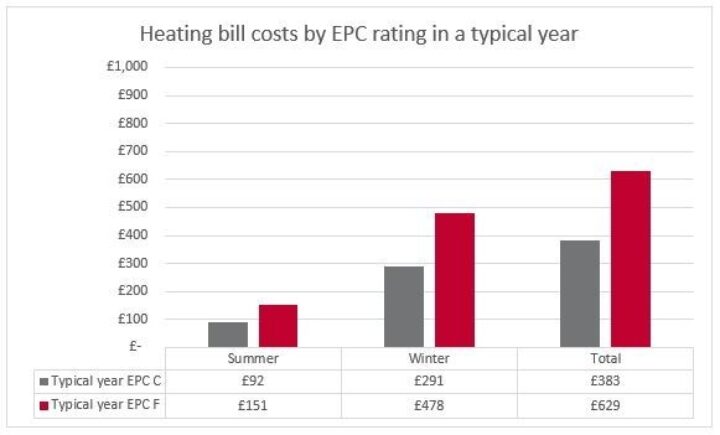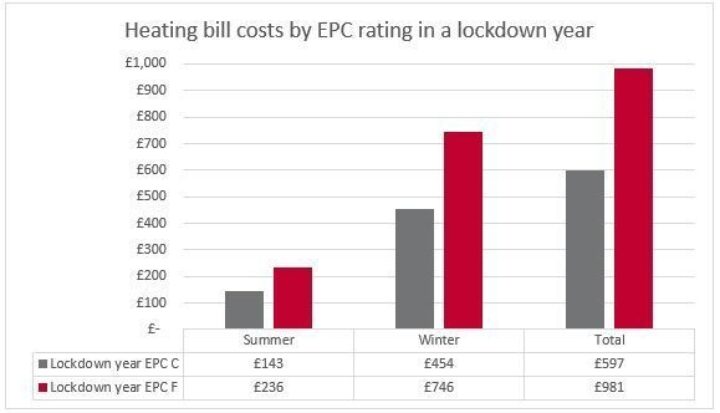Winter lockdown: families in the leakiest homes will bear the brunt
As we spend more time indoors, those in the leakiest homes will suffer from the largest energy bills

By Jess Ralston
@jessralston2Share
Last updated:
The current crisis has forced many aspects of life into focus. Health scares and economic pain mean that, for millions of families, outgoings such as energy bills that might have been manageable before could now cause misery.
Spending almost all of our working hours at home has a direct effect on our energy use, with homeworking, home-schooling and online socialising all pushing up domestic demand, and therefore increasing bills.
Using more energy isn’t a secret; 56% of Brits realise that their consumption is up, yet only 35% of the nation expect this to filter through into higher bills. Combine this with expectations of growing pressure on budgets – 44% of the public expect their financial situation to worsen over the next six months – and it is clear to see why energy experts and consumer groups are worried about the current situation extending into the winter.
Chilling forecast
If there is anything to be thankful for about the current situation, it is that it hasn’t happened in the winter. While sticking the heating on isn’t the first thing that springs to mind while we’re out sunning in gardens and parks, it doesn’t mean we’re not storing up trouble for later in the year.

New ECIU analysis shows that, when we do start reaching for the thermostat, the average increase in energy use to keep warm will increase by 56%. But this average figure masks the truth, that those in the leakiest and most poorly insulated homes will be facing a higher increase than those that waste less heat.
For the worst performing homes, those that are well below standards needed to meet both environmental and fuel poverty targets, a winter lockdown could add £49 to each monthly bill, a hit of nearly £300 over the coldest six months of the year, compared to homes that waste less heat.
And the findings don’t stop there. Families locked down in EPC band C homes (the goal that the Government wants all homes to hit by 2035) will face cheaper bills even during lockdown than those in Band F homes year after year.


Based on these findings, it is easy to see why there are very real concerns about the coming winter.
Prevention is cheaper than the cure
Through policies like the Winter Fuel Payment, the Government throws huge amount of cash at energy bills that are higher than they need to be. At the same time, refocussing actions to reduce energy waste onto fuel poor homes have pulled any incentive to upgrade tens of millions of ‘able to pay’ homes, action that is necessary to meet the UK’s net zero target.
Lack of policies has seen the rate of efficiency installations fall by 95% since 2012, a fact with clear links to the 2.4 million families currently living in fuel poverty.
And while there were promising signs in the Conservative’s 2019 Manifesto – more than £9 billion of state investment in leaky homes and public buildings, the spending lines needed to make it happen were absent from the budget.
As we look to life beyond the crisis, and to a Government that has already voiced plans to ensure that any recovery or stimulus package is as green as possible, it isn’t surprising that building efficiency is near the top of the list.
Upgrading the quality of life for families up and down the nation, easing pressure on household budgets to pump cash into local economies, and providing hundreds of thousands of skilled jobs in all regions are the prizes on offer.
On top of rushed-through recovery plans, 2020 brings a host of documents crucial to improving the nations building stock. The Energy White Paper, National Infrastructure Strategy, Fuel Poverty Strategy, and the Heat and Buildings roadmap, are all still rumoured to land this year – getting these right will prove vital in not only locking in lower bills, but for slashing energy waste and putting the country back on track to meet its carbon targets.
Share